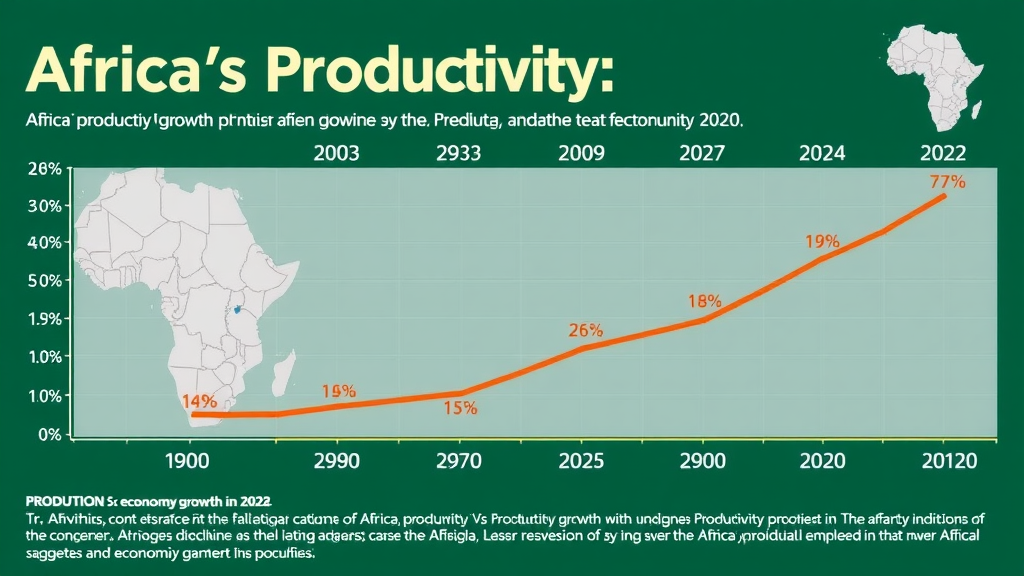Startling statistics reveal that Africa's productivity growth has plummeted to a mere 0.8% over the last decade, raising alarm bells about the continent's economic future. Acha Leke, a Senior Partner at McKinsey & Company, offers profound insights into these challenges and the transformative potential of the digital age. In this article, we delve into his expert perspective on Africa's workforce, highlighting the critical need for digital innovation to drive economic recovery and growth.
The Current State of Africa's Workforce
Understanding Low Productivity in Africa
Acha Leke, Senior Partner at McKinsey & Company, states, 'Productivity across the board is incredibly low [in Africa].'. This assertion underscores a critical challenge facing Africa's workforce today. While assessing various sectors, including services, agriculture, resources, and manufacturing, it is evident that Africa consistently ranks as either the least or the second least productive region globally. The implications of this low productivity are staggering, as it not only hampers economic growth but also exacerbates the cycle of poverty that affects 60% of the continent's population.

Statistics Highlighting the Productivity Crisis
Recent statistics paint a dire picture of Africa’s productivity crisis: from 2000 to 2010, productivity growth averaged 2.2% annually, but this figure fell to just 0.8% in the last decade. Furthermore, real GDP per capita has increased by a meager 1.1% since 1990. Unless significant changes are made, projections indicate that by 2030, over 80% of the world’s poor will be African, a stark increase from 14% in 1990.

The Role of Digital Technology in Transforming Productivity
Digital as a Catalyst for Change
Acha Leke emphasizes, 'Digital is the single most important lever to transform productivity in Africa.' By leveraging digital technology, Africa has the potential to enhance productivity across all sectors. The shift towards digital tools is not merely an optional upgrade; it is imperative for survival and growth. The integration of digital solutions can streamline operations, reduce inefficiencies, and make significant strides towards addressing the continent's productivity gap. For more on how collaborative strategies are fueling AI growth in Africa, visit this article.

Success Stories of Digital Transformation
Several success stories illustrate the power of digital innovation in boosting productivity. For instance, Africa dominates the mobile banking ecosystem, accounting for 60% of the world's mobile banking accounts. Moreover, during the COVID pandemic, the digitization of government services in Togo significantly improved efficiency, quadrupling revenues. Agricultural practices are also evolving, with digital innovations enabling farmers to minimize post-harvest losses and improve yield quality. To understand the broader economic implications, explore how Kenya's economy is navigating challenges with its slowest growth since 2020 here.

Challenges and Opportunities Ahead
Addressing the Skills Gap
Despite the opportunities presented by digital technology, a significant challenge remains: the skills gap. As digital tools proliferate, it is vital to equip the African workforce with the necessary skills to leverage these technologies effectively. Education systems must adapt and evolve to prepare young Africans for this transformation, fostering a generation that is not only digitally literate but also innovative and agile.

The Importance of Human Capital
Acha Leke argues, 'If we get this right, the biggest export from the continent is no longer going to be our resources. It's going to be our people.' This statement reflects a key insight into the future of Africa's workforce. Investing in human capital not only helps retain talent but also ensures that Africa can supply skilled individuals to meet global demands for digital services.

The Need for a Multi-Faceted Approach
To navigate the future landscape of work, a multi-faceted approach is essential. Stakeholders—including governments, educational institutions, and private enterprises—must collaborate to create an ecosystem that supports innovation, encourages entrepreneurship, and nurtures talent. Embracing diversity and fostering a culture of collaboration can pave the way for new ideas and initiatives that propel Africa’s workforce into the future. For insights into how private sectors are contributing to Africa's development, read about their role in universal health coverage here.

The Future of Africa's Workforce
Projected Workforce Growth by 2050
The future of Africa's workforce looks bright, with projections indicating that by 2050, Africa will have the world’s largest and youngest workforce. This demographic shift presents an unprecedented opportunity for economic transformation, provided that the continent effectively invests in skills development and digital infrastructure.

Global Implications of Africa's Workforce Development
The developments within Africa's workforce will not only reshape the continent but will also have global repercussions. As Africa becomes a hub for innovation and a source of talent, its integration into the global economy will intensify. This shift will bring both challenges and advantages, necessitating proactive strategies to harness the potential of this emerging workforce.
People Also Ask

Where is Acha Leke from?
Acha Leke is from Africa and is a prominent figure in the continent's development and economic discussion.
What is the workforce in Africa?
The workforce in Africa encompasses a diverse range of skills and professions, grappling with challenges such as low productivity but also brimming with potential for renewal through digital innovation.
Who is the head of McKinsey Africa?
Acha Leke serves as the head of McKinsey Africa, leading initiatives that shape the consulting firm's approach to the continent's challenges and opportunities.
Who is McKinsey partner in South Africa?
Acha Leke is also recognized as a partner at McKinsey in South Africa, advocating for policies and practices that enhance economic progression.
Explore trending insights about Africa's workforce and global market impact.
Key Takeaways
Summary of Insights from Acha Leke
- Acha Leke highlights the critical need for productivity improvement across all sectors in Africa.
- Digital transformation is identified as a vital leverage point to enhance Africa's workforce productivity.
- The role of human capital is paramount in defining the future economic landscape of the continent.
- Addressing the skills gap through comprehensive educational reforms is essential for preparing the workforce.
- The long-term success hinges on a collaborative approach among various sectors and stakeholders.
Conclusion
The future of Africa's workforce hinges on radical transformations powered by digital innovation. As emphasized by Acha Leke, the potential for economic growth is contingent upon improving productivity through effective investments in human capital and technology. By embracing these challenges and recognizing the opportunities they create, Africa can solidify its position as a global leader in the workforce landscape.
Discover Afridigest
Afridigest is building the most valuable platform for entrepreneurs in Africa, starting with ideas, analysis, and insights. Subscribe today to stay informed and engaged with the latest trends and developments.
 Add Row
Add Row  Add
Add 




Write A Comment